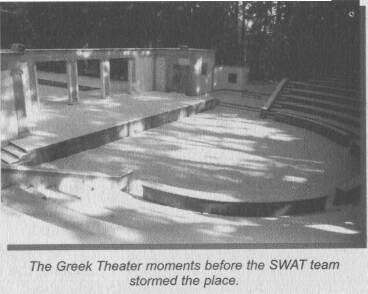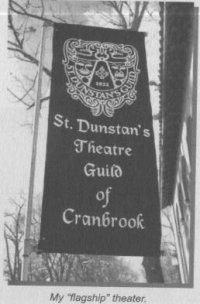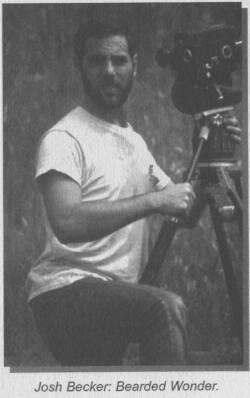If Chins Could Kill: Confessions of a B Movie Actor (7 page)
Read If Chins Could Kill: Confessions of a B Movie Actor Online
Authors: Bruce Campbell
Tags: #Autobiography, #United States, #General, #Biography & Autobiography, #Biography, #Entertainment & Performing Arts - General, #Entertainment & Performing Arts, #Actors, #Performing Arts, #Entertainment & Performing Arts - Actors & Actresses, #1958-, #History & Criticism, #Film & Video, #Bruce, #Motion picture actors and actr, #Film & Video - History & Criticism, #Campbell, #Motion picture actors and actresses - United States, #Film & Video - General, #Motion picture actors and actresses

Right at that very moment, it struck me that if I was an actor like Dad, I could skip that adult responsibility thing and just stick to the silly stuff.
Five years later and as many inches taller, my theory was put to the test -- right back at St. D's. The casting folks were pulling their hair out because a young actor had fallen ill. They very quickly had to find a replacement for the role of Prince Chululonghorn in their production of
The King and I.
For some unexplained reason, I was snatched from the chorus of kids and handed the role of the king's son. Surely, the old man must have whispered in someone's ear.
Next thing I knew, I was having body wash (affectionately called "Texas Dirt") applied to my entire body and I was changing in a real live actor's dressing room with adults.
The adrenaline rush of waiting for my cue in the "green room" was a new experience, and getting shoved on stage to sing in front of an audience terrified me, but call me crazy -- I liked it.
That summer, I picked up acting tips from the "veterans" at St. D's. A tongue-limbering exercise (one that I use to this day) came from a Ford Motor Company executive; a clothier coached me on a projection technique, but the most important tip of all came from a garage door salesman:
"Don't drink soda before you go on stage, kid. You don't want to burp during the climax of the play..."
Theater was the great equalizer -- I changed clothes in the same damp, concrete room as CEOs from Fortune 500 companies. Seeing their pasty, half-naked bodies and knowing that they were just as nervous as I was made everything all right somehow.
The following summers, I managed to act my way toward adulthood. In
Fiorello,
I itched like hell as a World War I soldier (Michigan + July + wool = misery), and drenched myself in Body Wash #7 as "Chang," the servant boy.
I could hear the casting folks musing over this one: "Let's get that kid who played that Siamese son. Maybe he can do Chinese."
When
South Pacific
rolled around, I was cast as a servant again -- a
Polynesian
one this time. I began to think that the casting gods were plotting against me. Type cast at fourteen -- a sure sign of things to come.
During this production, I got a peek at the relentless dedication an actor can have toward his craft. The flashy role of "Luther Billis" went to Ed Guest, a man who had been known to take a drink or two -- or five or six. Well, the day before our last performance, Ed was nabbed for drunk driving. He had the misfortune of being brought before Judge Gilbert, "the hanging judge." With no tolerance for what was his third offense, she ordered him to serve time in the county jail -- effective immediately.
Word of this got out to the folks at St. D's. Bear in mind, a number of "actors" at this humble community theater group were really high-powered professional people. One such member, Isabel Himelhoch, happened to pal around with a Michigan Supreme Court justice and put in an appeal to get Ed released for that one remaining show.
Meanwhile, my dad was collared to replace Ed if things didn't go through. He had been cast in a number of "character" roles at St. D's, but the big spotlight had swung around in his direction. I'd never seen Dad sweat so much as during that twelve-hour period. With script in hand, he circled our back deck, mumbling Luther Billis's many lines repeatedly.
Fortunately for Charlie, Ed was granted a release for that Saturday show, but we weren't out of the woods yet. Since the summer shows were all mounted at the outdoor theater, weather was a huge factor. Michigan is prone to summer thunderstorms and a big one was forecast for that night. If Saturday got rained out, Ed would remain in jail, a rain performance would be mounted that Sunday evening, and Charlie would get the nod.
As the curtain rose that night, Ed sang and danced his way across the stage while Mother Nature kept us on pins and needles. Wind raced through the pines surrounding the stage and thunder rumbled in the distance. There was no question about it -- a storm was gonna happen, it was just a matter of
when.
Act III began, and tiny drops of rain began to descend. Ed, giving the best performance of his life, was totally oblivious. Even the two burly police officers, assigned to monitor his every move, seemed to enjoy the show. Thankfully, the weather held until the final curtain and Ed got quite an ovation. I'm sure Charlie clapped harder than anyone.
Once off stage, Ed quietly changed back into civilian clothes and was escorted to the waiting patrol car. As the sedan pulled away, the heavens opened up and drenched all the well-wishers.
We toasted Ed at the cast party that night.
"To Ed! An
Actor's
actor!" someone shouted.
As I raised my glass of punch, I looked around the room. I had never before seen people so passionate, particularly about an amateur play, and I realized that this was the life for me.
I'm sure Charlie wasn't surprised when I announced that I wanted to be an actor. He also had dreams of becoming a painter, but my grandfather talked him out of it. Eager to see me free from a similar trap, Charlie encouraged me to get involved as deeply as I dared.
With this endorsement in hand, I set off to find out what this "actor" thing was all about.
3
THE ASSEMBLY OF LIKE-MINDED INDIVIDUALS
FORMATION OF THE "DETROIT MAFIA"
Michigan is surrounded by the largest supply of fresh water in the world -- hence the nickname of "the Great Lakes state." But there must have been something more to the water of southeastern Michigan, something that caused half a dozen young men to throw caution to the wind and pursue the film business.
Meet "The Boys":
Mike Ditz and I date back to pre-kindergarten. Our mothers drove neighborhood kids to various events and we shared company at a birthday party or two. Mike's dad documented many of these events with a hand-cranked, Kodak Brownie double 8mm camera.
We found this "adult toy" much more interesting than your average G.I. Joe. You had a choice of three lenses, mounted on a revolving turret. The film inside was actually 16mm, mounted on a twenty-five-foot roll. After exposing one side, you flipped it over and exposed the other side. The processing laboratory would split the film down the middle and voila -- you had 8mm home movies.
There were a few gizmos on this camera that just begged to be exploited, such as single-frame exposure. This allowed us to do magical things with the touch of a button. We could disappear, "animate" ourselves skidding across the ground, or change into Richard Nixon (my favorite mask at the time).
Mike's interest was primarily behind the camera, since he knew how to operate the damn thing. This was fine with me because it allowed me to jump in front of the lenses -- all three of them. In the early experiments we did, the concept of telling a story hadn't captured our imaginations yet -- that's where Scott Spiegel came in.
Junior high school hooks you up with kids from strange new lands. Scott was one of them. He lived near Walnut Lake, where my family had summer swimming privileges. Scott and I bumped elbows unknowingly at Gene's, the local candy store, buying
Spree
or banana-flavored Turkish Taffy.
In eighth-grade study hall, when Mike Ditz wasn't borrowing
Mad
magazines from him, Scott and I talked about movies and TV almost all the time. We both agreed that the new film,
The Poseidon Adventure,
was about the coolest disaster movie ever and that
The Ghoul,
a local TV show, was very funny. The gag of this cheesy show was to air a really bad horror film and the host, Ron Swede, would dub in his own disgusting sound effects and put on skits during commercial breaks. One of his favorite pranks was to blow things up with M-80s, and Scott was impressed that a prop I had sent in got blown to smithereens.
As it turned out, Scott also made 8mm films, but by the time I met him in 1972 he was a veteran. His first film,
Inspector Klutz Saves the Day,
was cranked out in 1969.
"It was the plot of Dr. Frankenstein who wants to find a normal brain to put into his monster," Scott remembered, matter-of-factly.
"I was Igor the monster. I guess we killed somebody or something and then planted the brain in the monster, but then monster comes alive and kills us, then Inspector Klutz comes in and kills the monster..."
Convoluted yes, but Scott's films at least had a plot. He was a Three Stooges fanatic, as were most of my male peers at the time (go ahead and sneer, girls -- pain is funny, I don't care what you say), and he was keen on redoing some of their classic shorts.
Scott's buddy, Matt Taylor, had a screening room in his basement. There, Scott showed me his latest effort,
Night in the Sanitarium.
This wasn't some handheld, out-of-focus piece of crap, it was a real movie with sets and costumes and even stock footage.
I couldn't help but be interested, and I mooched my way into Scott's world, appearing first as a thug in his
Three Smart Saps.
I had access to my very own wardrobe (courtesy of St. D's), so I came with a few tricks of my own.




